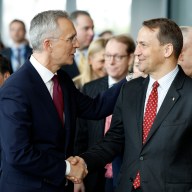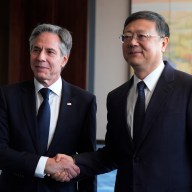By Igor Ilic and Ivana Sekularac
ZAGREB/BELGRADE (Reuters) – Croatia celebrated its independence victory on Friday while Serbs mourned, with relations between the former-Yugoslav neighbors strained by a war of words that could hinder Serbia’s bid to join the European Union. Serbia’s prime minister wrote to the EU this week to protest against what he called anti-Serb politics in Croatia, an EU member which his foreign minister accused of “rehabilitating fascism” after a court annuled a 1946 verdict against a Catholic cleric whom Serbia views as a war criminal. Croatia’s foreign minister replied: “We are not going to allow anyone to talk to Croatia like this.”
Tensions were also strained when Croatia unveiled a monument to the man who killed Yugoslavia’s ambassador to Sweden in the 1970s.
“This is a sad day,” Serb Prime Minister Aleksandar Vucic told thousands gathered for a church service in a Belgrade suburb, referring to Croatia’s final offensive to drive Serb forces out. He said Serbia had protested to the EU to make Croats “ashamed because of Serbian blood on their hands and ethnic cleansing in 1995,” a reference to events in the Balkan wars.
Domestic politics may have fueled the rhetoric, with Croatia holding elections on Sept. 11 and Serbia likely to have a new government in the next few days after its own elections in April.
“We will only know once the new governments in Croatia and Serbia are formed whether the current rhetoric between the two countries is something more serious than usual,” said Zarko Puhovski, a political analyst in Croatia. After Croatia declared independence from Yugoslavia in 1991, its rebel Serbs, backed by Belgrade, seized one-third of the territory while killing and expelling the local Croat population.
Zagreb retook most of the rebel-held lands in August 1995 in a four-day offensive called “Operation Storm”, which culminated with the capture on Aug. 5 of the rebel Serb stronghold of Knin. The plundering of Serb property and killings of elderly Serb civilians in the immediate aftermath of the offensive has remained a constant source of tension with Belgrade, where processions and church services were held on Thursday and Friday to commemorate victims. Croatian President Kolinda Grabar-Kitarovic told war veterans assembled in Knin on Friday: “It must be known that the (Operation) Storm was politically justified, ethically clean and militarily brilliant and a honorable victory for a just cause.” Addressing Serbia’s EU membership bid, for which good relations with its neighbors is a key condition, she said:
“Serbia’s entry into the EU is in interest of Croatia and Europe as a whole. We will support it, but will also at the same time protect our national interests.”
(This version of the story has been refiled to replace “Croats” with “Croatia” at start)
(Editing by Ingrid Melander and Robin Pomeroy)


















